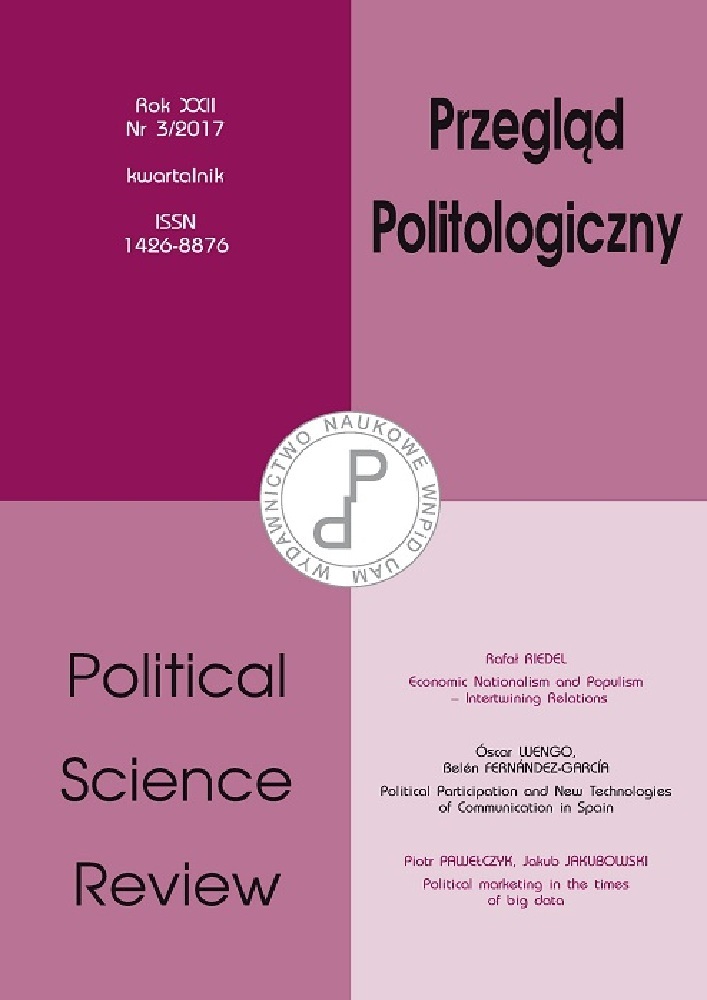Abstrakt
Od 1946 r., Turcja jest demokracją wielopartyjną – w państwie tym regularnie odbywają się wolne, konkurencyjne wybory. Jednak w ostatnim dziesięcioleciu, wraz z konsolidacją władzy przez Partię Sprawiedliwości i Rozwoju, pojawia się coraz więcej wątpliwości co do uczciwości wyborów. Partia rządząca zaczęła uciekać się do szeregu środków, ograniczających ich konkurencyjność. Celem artykułu jest ukazanie skali nadużyć wyborczych w Turcji, z naciskiem na jeden z trzech głównych obszarów manipulacji wyborczych, to jest manipulowanie “preferencjami wyborców” (vote choice), który wydaje się być najbardziej problematyczny. Ambicją autorów jest udzielenie odpowiedzi na pytanie, czy wybory w Turcji, mimo obserwowanych nieprawidłowości, nadal spełniają międzynarodowe standardy, czy też Turcja staje się ‘wyborczą autokracją’?Bibliografia
Akarca A. T. (2015), Putting Turkey’s June and November 2015 Election Outcomes in Perspective, “Insight Turkey”, vol. 17, no. 4, pp. 81–104.
Akkoyunlu K. (2017), Electoral Integrity in Turkey: From Tutelary Democracy to Competitive Authoritarianism, in: Authoritarian Politics in Turkey: Elections, Resistance, and the AKP, eds.
B. Başer, A. E. Öztürk, I. B. Tauris, London (forthcoming).
Aslan-Akman C. (2012), The 2011 Parliamentary Elections in Turkey and Challenges Ahead for Democratic Reform Under a Dominant Party System, “Mediterranean Politics”, vol. 17, no. 1, pp. 77–95.
Aygül C. (2015), Electoral manipulation in March 30, 2014 Turkish local elections, “Turkish Studies”, vol. 17, no. 1, pp. 181–201.
Bardakçı M. (2016), 2015 parliamentary elections in Turkey: demise and revival of AKP’s single-party rule, “Turkish Studies”, vol. 17, no. 1, pp. 4–18.
Birch S. (2011), Electoral malpractice, Oxford University Press, New York.
Çarkoğlu A., Yıldırım K. (2015), Election Storm in Turkey: What do the Results of June and November 2015 Elections Tell Us, “Insight Turkey”, vol. 17, no. 4, pp. 57–79.
Early Parliamentary Elections, 1 November 2015, OSCE/ODIHR Limited Election Observation Mission. Final Report (2016), Warsaw 28 January, http://www.osce.org/odihr/elections/turkey/186031, 10.01.2017.
Eligür B. (2009), Turkey’s March 2009 Local Elections, “Turkish Studies”, vol. 10, no. 3, pp. 469–496.
Erdoğan medya ile beyin yıkıyor (2014), “Zaman” of 19 August, http://www.zaman.com.tr/gundem_erdogan-medya-ile-beyin-yikiyor_2238375.html, 12.01.2017.
Erisen C., Kubicek P. (eds.) (2016), Democratic consolidation in Turkey: Micro and macro challenges, Routledge, London–New York.
Esen B., Gümüşçü S. (2016), Rising Competitive Authoritarianism in Turkey, “Third World Quarterly”, vol. 37, no. 9, pp. 1581–1606.
Gilbert L., Mohseni P. (2011), Beyond Authoritarianism. The Conceptualization of Hybrid Regimes, “Studies in Comparative International Development”, vol. 46, pp. 270–297.
Kalaycıoğlu E. (2015), Turkish Popular Presidential Elections: Deepening Legitimacy Issues and Looming Regime Change, “South European Society and Politics”, vol. 20, no. 2, pp. 157–199.
Marschall M., Aydoğan A., Bulut A. (2016), Does housing create votes? Explaining the electoral success of the AKP in Turkey, “Electoral Studies”, vol. 42, pp. 201–212.
Norris P., Martínez and Coma F., Nai A., Grömping M. (2015), The World’s Flawed and Failed Contests. The Year in Elections, 2014, The Electoral Integrity Project, February, https://research.hks.harvard.edu/publications, 15.01.2017.
Norris P., Martínez and Coma F., Nai A., Grömping M. (2016), The Year in Elections, 2015: The expert survey on perceptions of electoral integrity, The Electoral Integrity Project, February, https://dash.harvard.edu/handle/1/27030113, 15.01.2017.
Norris P. (2015), Why elections fail, Cambridge University Press, New York.
Norris P. (2014), Why electoral integrity matters, Cambridge University Press, New York.
OSCE/ODIHR Limited Election Observation Mission to Turkey, Parliamentary Elections 2015, Media Monitoring Results (2015), http://www.osce.org/odihr/elections/turkey/177926?download=true, 10.01.2017.
Przeworski A. (1991), Democracy and the Market: Political and Economic Reforms in Eastern Europe and Latin America, Cambridge University Press, New York.
Republic of Turkey. Parliamentary election 7 June 2015, OSCE/ODIHR Limited Election Observation Mission Final Report (2015), Warsaw, 18 August, http://www.osce.org/odihr/elections/turkey/177926?download=true, 10.01.2017.
Republic of Turkey, Presidential Election, 10 August 2014, OSCE/ODIHR Limited Election Observation Mission, Final Report (2014), Warsaw 18 November, http://www.osce.org/odihr/elections/turkey/119672, 10.01.2017.
Sayarı S. (2016), Back to a predominant party system: the November 2015 snap election in Turkey, “South European Society and Politics”, vol. 21, no. 2, pp. 263–280.
Sayarı S. (2012), Political Parties, in: The Routledge Handbook of Modern Turkey, eds. M. Heper, S. Sayarı, Routledge, London–New York, pp. 182–193.
Sayarı S. (ed.) (2002), Politics, parties and elections in Turkey, Lynne Rienner, Boulder–London.
Schedler A. (2006), Electoral authoritarianism: the dynamics of unfree competition, Lynne Rienner Publisher, Boulder–London.
Schedler A. (2002), The Menu of manipulation, “Journal of Democracy”, vol. 13, no. 2, pp. 36–50.
Schedler A. (2013), The politics of uncertainty: sustaining and subverting electoral authoritarianism, Oxford University Press, Oxford.
Simpser A. (2013), Why governments and parties manipulate elections: Theory, practice, and complications, Cambridge University Press, New York.
Sütçü G. (2011), Playing the game of democracy through the electoral mechanism: The Democratic Party experience in Turkey, “Turkish Studies”, vol. 12, no. 3, pp. 341–356.
Tachau F. (2000), Turkish political parties and elections: Half a century of multiparty democracy, “Turkish Studies”, vol. 1, no. 1, pp. 128–148.
Taş H. (2015), Turkey – from tutelary to delegative democracy, “Third World Quarterly”, vol. 36, no. 4, pp. 776–791.
Turkish Elections. Presidential Elections (2014), Rethink Institute, Washington DC, August, http://www.rethinkinstitute.org/turkish-elections, 12.01.2017.
Yılmaz G. (2016), Europeanization or De-Europeanization? Media Freedom in Turkey (1999–2015), “South European Society and Politics”, vol. 21, no. 1, pp. 147–161.
